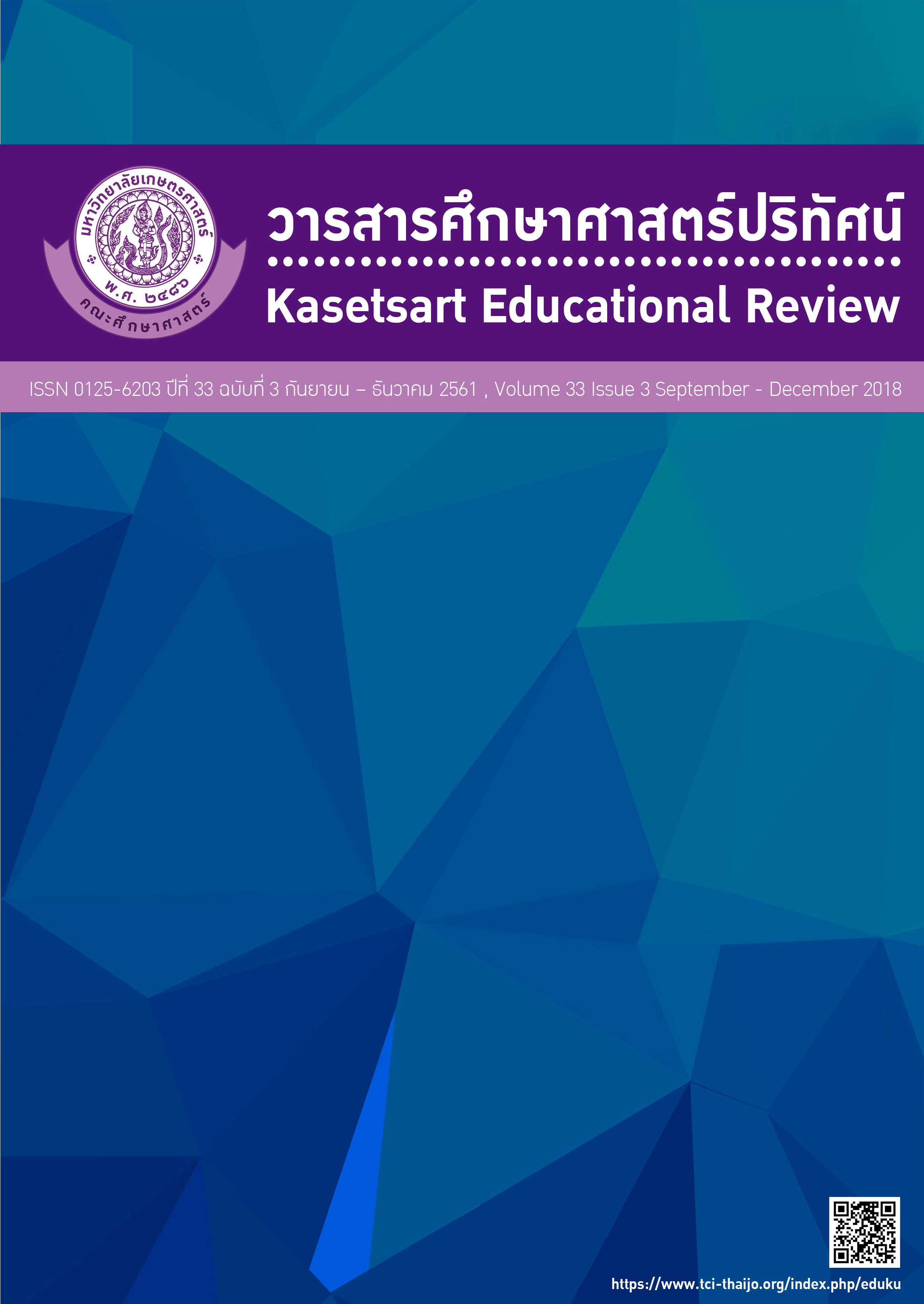วัฒนธรรมไม่ใช่แค่หลักสูตร : สิ่งที่ทำให้เกิดความเป็นเลิศทางการศึกษาของประเทศกลุ่มเอเชียตะวันออก
คำสำคัญ:
การศึกษาวิทยาศาสตร์, หลักสูตร, วัฒนธรรมบทคัดย่อ
ระบบการศึกษาที่มีประสิทธิภาพและการให้ความสำคัญกับวัฒนธรรมถือเป็นรากฐานสำคัญของการพัฒนาทรัพยากรมนุษย์ของประเทศในกลุ่มเอเชียตะวันออก กล่าวคือ การศึกษาที่มีคุณภาพสูง การสอนให้รู้จักการคิดวิเคราะห์จนเกิดเป็นทักษะติดตัว ร่วมกับการสร้างความเข้าใจในวัฒนธรรมของตนเองในมิติที่จะนำมาใช้เพื่อการพัฒนาประเทศ ทำให้เยาวชนรุ่นใหม่มีความภาคภูมิในการเป็นพลเมืองของประเทศตนเอง การบูรณาการระหว่างวัฒนธรรม หลักสูตร และการศึกษา สนับสนุนให้คนรุ่นใหม่ยอมรับ เรียนรู้ และประยุกต์ใช้วัฒนธรรมต่างชาติอย่างรู้เท่าทัน โดยวัฒนธรรมนับเป็นกุญแจสำคัญที่ทำให้ประเทศในกลุ่มเอเชียตะวันออกประสบความสำเร็จในการศึกษาและการพัฒนาประเทศในทุกมิติ
เอกสารอ้างอิง
Chang, C. Y. (2017, December). Taiwanese literacy-oriented curriculum reform: Past, present, and the possible future. Paper presented at 2017 HU-SNU-NTNU-KU Joint-Symposium for Science Education. Sapporo, Japan.
Eom, K., and Martin, S. N. (2017, December). Examining trends in gamification in education and the potential for application to the 2015 Korean National Science Curriculum. Paper presented at 2017 HU-SNU-NTNU-KU Joint-Symposium for Science Education. Sapporo, Japan.
Jansong, C., Pitiporntapin, S., and Chumnanpuen, P. (2017, December). High school students’ informal reasoning patterns in the lesbians, gays, bisexuals, and transgenders (LGBT) blood donation issue and factors influencing their informal reasoning. Paper presented at 2017 HU-SNU-NTNU-KU Joint-Symposium for Science Education. Sapporo, Japan.
Kang, D. Y., and Martin, S. N. (2017, December). Exploring the usage of digital textbook in science education for culturally and linguistically diverse student. Paper presented at 2017 HU-SNU-NTNU-KU Joint-Symposium for Science Education. Sapporo, Japan.
Ketsing, J., Inoue, N., and Buczynski, S. (2017, December). Pre-service science teachers’ reflective quality on inquiry: What novices see in practices? Paper presented at 2017 HU-SNU-NTNU-KU Joint-Symposium for Science Education. Sapporo, Japan.
Kim, Y, and Yoo, J. (2017, December). An analysis of postings about teaching lenses in an autonomous online elementary teacher community. Paper presented at 2017 HU-SNU-NTNU-KU Joint-Symposium for Science Education. Sapporo, Japan.
Kongkoey, T., Ketsing, J., and Boonsoong, B. (2017, December). Exploring high school students’ learning progression for carbon cycling. Paper presented at 2017 HU-SNU-NTNU-KU Joint-Symposium for Science Education. Sapporo, Japan.
Lee, Y., and Kim, H. B. (2017, December). Exploring teachers’ enactment of scientific argumentation lessons focused on epistemological resources. Paper presented at 2017 HU-SNU-NTNU-KU Joint-Symposium for Science Education. Sapporo, Japan.
Luehmann, A. L. (2007). Identity development as a lens to science teacher preparation. Science Education, 91, 822-839. DOI 10.1002/sce.20209
Ohno, E. (2017, December). What does “資質 ,能力” mean in the new course of study? Paper presented at 2017 HU-SNU-NTNU-KU Joint-Symposium for Science Education. Sapporo, Japan.
Pinthong, T., Ketsing, J., and Jaitrong, W. (2017, December). From student to teacher: Relation between preservice science teachers’ prior experience and self-efficacy belief of inquiry-based learning. Paper presented at 2017 HU-SNU-NTNU-KU Joint-Symposium for Science Education. Sapporo, Japan.
Yoo, J., and Kim, H. (2017, December). Key competences and science curriculum in Korea. Paper presented at 2017 HU-SNU-NTNU-KU Joint-Symposium for Science Education. Sapporo, Japan.
Yang, F. Y. (2017, December). Instructional suggestions supporting science learning in digital environments based on a review of eye tracking studies. Paper presented at 2017 HU-SNU-NTNU-KU Joint-Symposium for Science Education. Sapporo, Japan.
ดาวน์โหลด
เผยแพร่แล้ว
ฉบับ
ประเภทบทความ
สัญญาอนุญาต
บทความทุกบทความเป็นลิขสิทธิ์ของวารสารคณะศึกษาศาสตร์ มหาวิทยาลัยเกษตรศาสตร์ วิทยาเขตบางเขน
วารสารศึกษาศาสตร์ปริทัศน์ (Kasetsart Educational Review)






